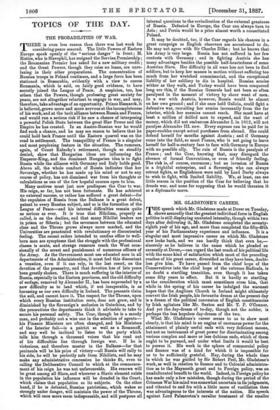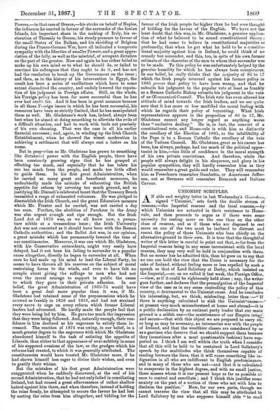MR. GLADSTONE'S CAREER.
THE speech which Mr. Gladstone made at Dover on Tuesday, shows assuredly that the greatest individual force in English politics is still displaying unabated intensity, though within two days after delivering it, Mr. Gladstone completed the seventy- eighth yea',r of his age, and more than completed the fifty-fifth year of his Parliamentary experience and influence. It is a singular and most impressive career on which Mr. Gladstone now looks back, and we can hardly think that even he,— sincerely as he believes in the cause which he pleaded so earnestly at Dover,—can regard the last reach of his political life with the same kind of satisfaction which most of the preceding reaches of his great career, diversified as they have been, doubt, less give him. To have passed from the chief hope of the Conservatives into the chief hope of the extreme Radicals, is no doubt a startling transition, even though it has taken some fifty years to effect. But it is hardly so startling as the consideration which must sometimes cross him, that while in the spring of his career he indulged the warmest hopes that the Anglican Church in Ireland might ultimately convert the Isiah people, his favourite dream at the present day is a dream of the political conversion of English constituencies by Irish agitators like Mr. Sexton and Mr. T. P. O'Connor. And yet the day-dream of to-day, though not the nobler, is perhaps the less hopeless day-dream of the two.
What Mr. Gladstone's career seems to us to show most clearly, is that his mind is an engine of enormous power for the attainment of plainly useful ends with very deficient means, but not an instrument of great power for discriminating among various complex and more or less dubious ends, which of them ought to be pursued, and under what limits it would be best to pursue it. His work in the sphere of commercial policy and finance was of a kind for which it is impossible for us to be sufficiently grateful. Nay, daring the whole time in which he was guided by Sir Robert Peel, Mr. Gladstone's work, as well in relation to finance and to Colonial administra- tion as to the Maynooth grant and to Foreign policy, was an unadulterated benefit to the world. Indeed, in Foreign policy he has made only a few mistakes, though during the period of the Crimean War his mind was somewhat uncertain in its judgments, and vibrated to and fro with a little more of vacillation than was advantageous to the interests of the nation. His speech against Lord Palmerston's cavalier treatment of the smaller Powers,—in that case of Greece,—his stroke on behalf of Naples, the influence he exerted in favour of the surrender of the Ionian Islands, his important share in the making of Italy, his re- storation of Thessaly to Greece, his steady pressure in favour of the small States of the Balkan, and his shielding of Belgium during the Franco-German War, have all indicated a temperate sympathy with the liberties of smaller Powers, and a great appre- ciation of the folly, as well as the mischief, of arrogant dictation on the part of the greater. Now and again he has either failed to make up his own mind as to what he should do, or failed to convince his colleagues that they ought to do it, and has not had the resolution to break up the Government on the issue ; and then, as in the history of his intervention in Egypt, the result has been a series of vacillations which have to some extent discredited the country, and unduly lowered the reputa- tion of his judgment in Foreign affairs. Still, on the whole, his Foreign policy has been far more successful than he has ever had credit for. And it has been in great measure because in all those Foreign issues in which he has been successful, his resources have been so strictly limited, that he has manipulated them so well. Mr. Gladstone's work has, indeed, always been beat when he aimed at doing something to alleviate the evils of a difficult situation, and had to work with tools not precisely of his own choosing. That was the case in all his earlier financial successes ; and, again, in winding up the Irish Church Establishment, when he showed the wisest moderation in achieving a settlement that will always cast a lustre on his name.
But in proportion as Mr. Gladstone has grown to something like dictatorial power with the English people, there have been constantly growing signs that he has grasped at effecting too much, and especially that he has taken his cue too much from the people, and made too little effort to guide them. In his first great Administration, when he carried so many great and beneficent measures, he undoubtedly made the mistake of exhausting the British appetite for reform by covering too much ground, and so justifying Mr. Disraeli's celebrated taunt that the Treasury Bench resembled a range of exhausted volcanoes. He was pledged to disestablish the Irish Church, and the great Education measure which Mr. Forster and he carried, was not carried a day too soon. Further, the abolition of Purchase in the Army was also urgent enough and ripe enough. But the Irish Land Act of 1870 was, as we all know now, a prema- ture nibble at a tremendous issue ; the Irish University Act was not concerted as it should have been with the Roman Catholic authorities ; and the Ballot Act was, in our opinion, a great mistake which has permanently lowered the tone of our constituencies. Moreover, it was one which Mr. Gladstone, with his Conservative antecedents, might very easily have delayed, had it not been his failing to surrender to a popular cause altogether, directly he began to surrender at all. When once he had made up his mind to lead the Liberal Party, he seems to have thrown all his reserves on the subject of moral restraining forces to the winds, and even to have felt no scruple about giving the suffrage to men who had not even the moral courage to support in public the cause to which they gave in their private adhesion. In our belief, the great Administration of 1869-74 would have been a great deal more popular than it was, if Mr. Gladstone had retained some of the prepossessions which he avowed so frankly is 1858 and 1859, and had not strained every nerve to urge on every reform which former Liberal leaders had advocated. He hardly made the people feel that they were being led by him. He gave too much the impression that they were being followed. And, naturally enough, their con- fidence in him declined as his eagerness to satisfy them in- creased. The reaction of 1874 was owing, in our belief, in a much greater degree to the eagerness with which Mr. Gladstone abandoned himself to the task of satiating the appetite of Liberals, than either to that appearance of over-subtlety in some of his supposed evasions of the law, or the grudges which his reforms had created, to which it was generally attributed. The constituencies would have trusted Mr. Gladstone more, if he had shown himself less eager to divine their wishes, and even to gratify their whims. But the mistakes of his first great Administration were exaggerated when he suddenly discovered, at the end of his second Administration, that he had not only failed in conciliating Ireland, bat had roused a great effervescence of rather shallow hatred against him there, and when therefore, instead of holding the reins firmly, he attempted to secure the favour he had lost by casting the reins from him altogether, and bidding for the
favour of the Irish people far higher than he had ever thought of bidding for the favour of the English. We have not the least doubt that this was, in Mr. Gladstone, a genuine applica- tion of what he believed to be sound constitutional theory ; that he had come to believe in constitutional majorities so profoundly, that when he got what he held to be a constitu- tional majority against him in Ireland, he could think of no remedy but surrender, and this, too, in spite of his own former estimate of the character of the men to whom that surrender was to be made. To this policy he was unfortunately helped by the genuine humility for which he has always been conspicuous. In our belief, he really thinks that the majority of 86 to 17 which the Irish people returned against his former policy in 1885 proves that policy to have been wrong, and that he submits his judgment to the popular vote at least as frankly as a Roman Catholic Bishop submits his judgment to the vote of an CEenmenical Council. The Irish vote has even altered his attitude of mind towards the Irish leaders, and we are quite sure that it has more or less modified the moral feeling with which he regards their policy of boycotting. What Irish representatives approve in the proportion of 86 to 17, Mr. Gladstone cannot any longer regard as anything worse than "exclusive dealing." He is, in fact, the convert of a constitutional vote, and Home-rule is with him as distinctly the corollary of the Election of 1885, as the infallibility of the Pope is to a Roman Catholic the corollary of the vote. of the Vatican Council. Mr. Gladstone, great as his career has been, has always, perhaps, had too much of the political °ppm,- tunist in him,—too little of confidence in the moral strength of his own private convictions. And therefore, while the people will always delight in his eloquence, and glory in his popular sympathies, they will hardly remember him as they would remember a great guide and rater. They will remember him as Frenchmen remember Gambetta, or Americans Jeffer- son, not as Germans will remember Bismarck and Italians Cavonr.







































 Previous page
Previous page